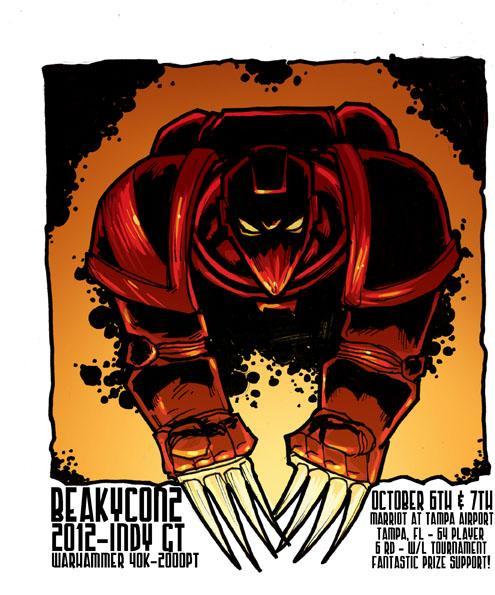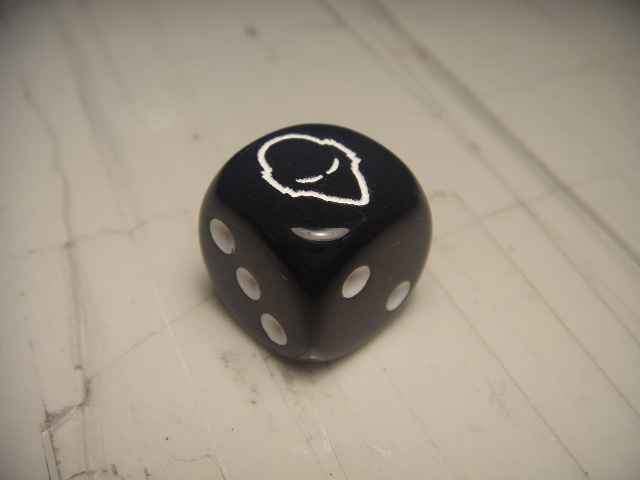6th Edition is here to stay and already impacting the tournament scene. Lets discuss one approach to incorporate the new 6th edition rules in a 40k Grand Tournament.
I am sure that over the next year or so TOs (Tournament Organisers) will be learning from each other to come up with the best system whether it be a W-L or W-L-D format. This is very exciting to me since it is something totally new due to the many changes in missions that have come with 6th edition.
Introduction to 6th
This is a big challenge for TOs across the US as there are many changes and additions to the missions in the new rulebook. Some of the new additions add an element of randomness to the game which is typically shunned by competitive tournament gamers. I have developed a W-L system I believe incorporates a lot of the new rules while still maintaining a no nonsense approach to running a tournament and I believe that many gamers want to use many of the new rules. At first I had a mindset to still use the 5th format for missions after first reading all the rules and playing a few games. I then started to warm up to many of the changes as I played more games. Like I said though some of the changes can be quite random and also require more time to play a game. Therefore I stuck with the changes that tend to be less random and not so time consuming. There are also some new things such as double FoC which have not been received well so I steered clear of them as well. The final goal is to develop a system for 6th edition that appeals to the majority of tournament gamers which I’ll share here.
Mission Format & Scoring System (W/L)
We have been plugging away playing plenty of 40k6 games to work out what we think will provide for a competitive tournament and be within the brand new spirit of 6th edition. We won’t be using everything from the new rule book though due to the desire to cut down on the overall complexity/randomness and keep the time required to play at least five turns per game at a reasonable length.
Here are my mission rules and general format:
— Most of the missions will feature holding objective markers as the primary objective. Each objective marker is worth 3 battle points. The number of objective markers per mission can vary from three to five. Placing the objective markers will be pre-determined and laid out in the rules for each mission.
— A couple missions will feature kill points as the primary objective. This is to prevent players from solely designing their armies around one type of objective.
— Each enemy unit you destroy or is broken and falling back at the end of the game is worth 1 battle point.
— Bonus battle points are awarded as follows (1 battle point each):
• First Blood
• Slay the Warlord
• Linebreaker
If at the end of a game both players are tied on objective markers then the first tie breaker is determined by total battle points.
If at the end of a game both players are also tied on battle points then the second tie breaker is decided by pure victory points.
— Deployment zones will be chosen from the rule book.
— Seize the Initiative is in.
— Warlord traits are in.
— Terrain will be preplaced on all tables by the TOs.
— Night Fight as per the new rulebook is in.
— Allies are in.
— Double FOC is out.
— New psychic powers are in.
— Special/mysterious terrain effects are out.
— Mysterious objective effects are out.
— You can take one fortification in your overall FOC except for the Fortress of Redemption and Skyshield Landing Pad (due to their large size).
— Random game length is in but modified – six turns then a seventh final turn on a roll of 4+ on 1d6.
Rounds and Other Stuff
Each round is 2.5 hours long – we believe this is the time required to play a 1999 point game that could go 7 turns. We also highly encourage everyone to play at least five turns per round and will monitor players for slow play (refer to the corresponding note below). Dice down immediately when time is called!
The first round will have random pairings, after that Swiss style pairings will be used for the rest of the remaining rounds. At the end of the sixth round there will be one undefeated player who will be crowned the Warmaster (best general). The player with the second best record will be crowned the Emperor’s Champion (2nd best general). There will be an award for Best Army (appearance and theme – chosen by the TOs) and an award for Players’ Choice.
Each game you will record how many turns you played. To discourage slow play if a player is found to have only played four turns or less over the course of several games they may have points deducted from their final total battle points score. You will also be required to mark down if you enjoyed your game along with answering some pertinent questions such as “Was your opponent at the table prior to the start of the game?” So good sportsmanship is very important as always – Don’t be that person no one enjoys playing!
All armies must be painted (three color minimum plus flocked bases). If you bring an army that isn’t fully painted you’ll have some points deducted from from your final total battle points.
WYSIWYG is required for every model in your army.
Counts As… Don’t bring dark eldar and plan to play them as eldar… Don’t bring a Wraithlord and plan to use it as a Talos. Your opponents should be able to easily recognize what every model in your army counts as.
We will use only GW official material for rules – rulebook, codices and FAQs/Errata. A codex must be released to the public for at least one month ahead of the event.
Now I would like to put in a plug for the GT – where you can see the grand experiment in action.
BeakyCon 40k Indy GT – Tampa, FL – October 6-7
Before you know it we will be rolling dice again in Tampa. This year is the first for 6th edition and you will be playing in one of the first national GTs to usher in the new edition.







